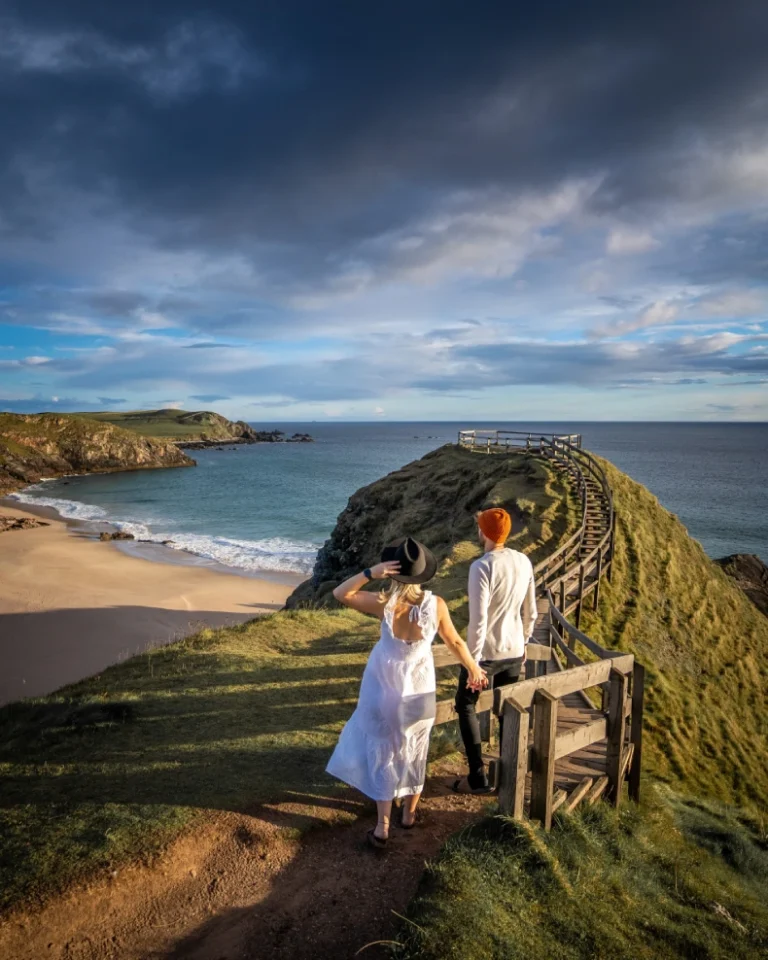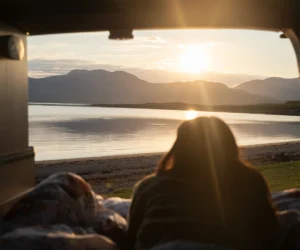Which Is The Best Base?
Wherever you are driving in the UK and Ireland – a sea-scorched coastal track, a gloomy gorse-clad glen, a mountain-dappled moor – every roadtripping team has the same thought sooner or later:
Where are we going to sleep tonight?
Whether out in the sticks or at the edge of a city, options for your holiday budget can be limited. We have had to choose between overpriced hotels and noisy hostel dorms at the last minute, and paid dearly (often literally). However, our setbacks can be your springboard!
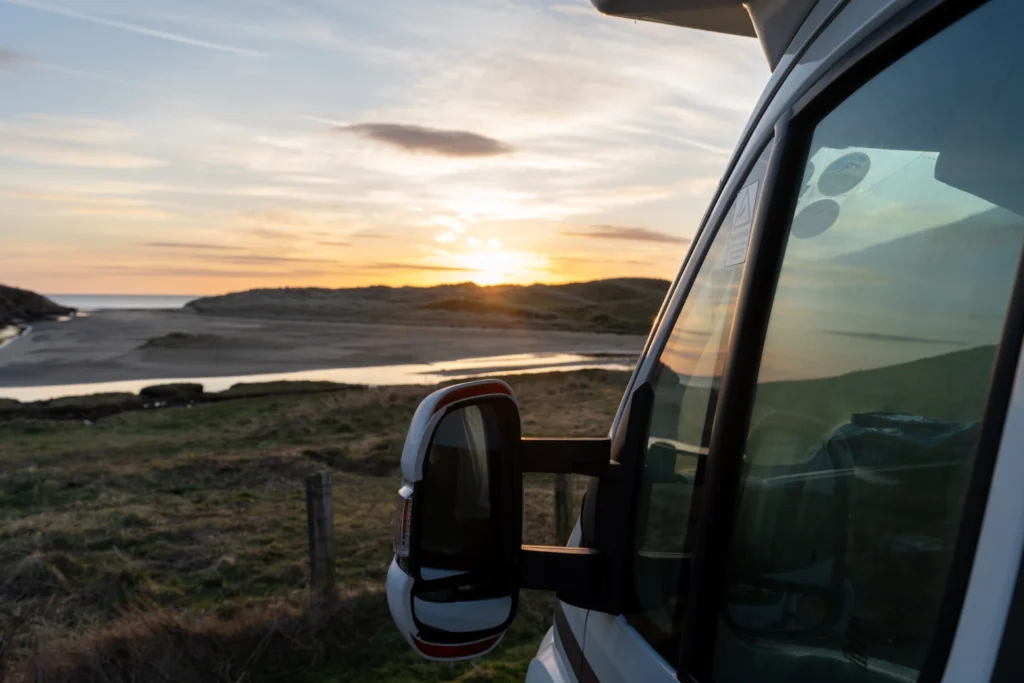
Our guide here takes you through three of our favourite alternative accommodation styles for your next road trip (as well as each of their pros and cons), helping you find the perfect fit for what could be your most incredible adventure yet!
Let’s get to it!
The Allure of the Alternative
There’s a growing movement towards more experiential travel, where the journey and the accommodation become integral parts of the adventure! Hotels and hostels certainly have their place, offering convenience and comfort.
However, they still often lack that unique sense of freedom and immersion that creates great stories to take home – sleeping under the stars, making breakfast to the sounds of birdsong, or having your duvet wherever you roam!
Table of Contents
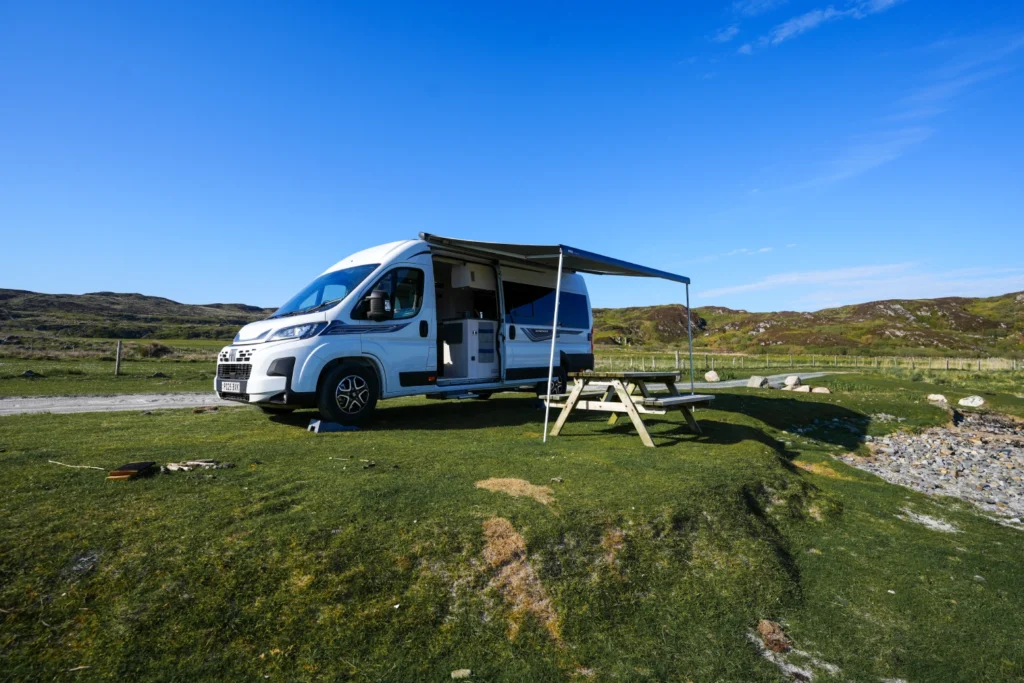
Campervanning: Home on Wheels!
Imagine stumbling upon a charming village, a breathtaking viewpoint, or a secluded beach – with a campervan, you can simply park up and linger as long as you wish (adhering to regulations, of course!). That is the essence of campervanning – a perfect fusion of freedom, comfort, and adventure – so it’s no wonder it’s becoming an increasingly popular choice for couples, families, and solo explorers alike!
Why You’ll Love It
- Freedom and Flexibility: The daily hassle of packing and unpacking is also eliminated, allowing your journey to be as spontaneous as you desire. This sense of freedom and control over your adventure is truly empowering.
- Comfort on the Go: Modern campervans are remarkably well-equipped, providing all the comforts of home. You can cook dinner, enjoy a hot shower, and sleep soundly in a proper bed, all while on the move.
- A Paw-rfect Choice: Many campervan rentals are pet-friendly, so feel free to bring your furry friends along too!
- Cost-Effective Long-term: Although the initial rental cost may seem substantial, consider the significant savings on hotels, restaurants, and public transportation. For multi-day or multi-week adventures, a campervan is often more economical, especially if you prioritise cooking your meals!
- Embrace Self-Sufficiency: A campervan grants you a high degree of independence. With your water supply, power (via leisure batteries and hook-ups), and often waste disposal facilities, you’re free to venture off the beaten path without concerns about locating amenities.
- Weather Protection: Regardless of the weather or setbacks, rest easy knowing your refuge is safe and secure!
Things to Consider
- Driving and Parking: Campervans can make navigating narrow country lanes, busy city streets, and finding suitable parking spots a bit more challenging for beginners!
- Campsite Dependence: While wild camping in a campervan is possible in some areas, many locations require you to stay on designated campsites, which come with a fee and can sometimes book up quickly.
- Facility Fuss: While self-sufficient, you’ll eventually need to empty waste tanks, refill water, and recharge batteries. Finding these facilities can sometimes be a minor inconvenience, especially in remote areas.
- Stealth Camping Limitations: While some people attempt ‘stealth camping’ in urban areas, it’s often discouraged or illegal, and can lead to unwanted attention or even fines.
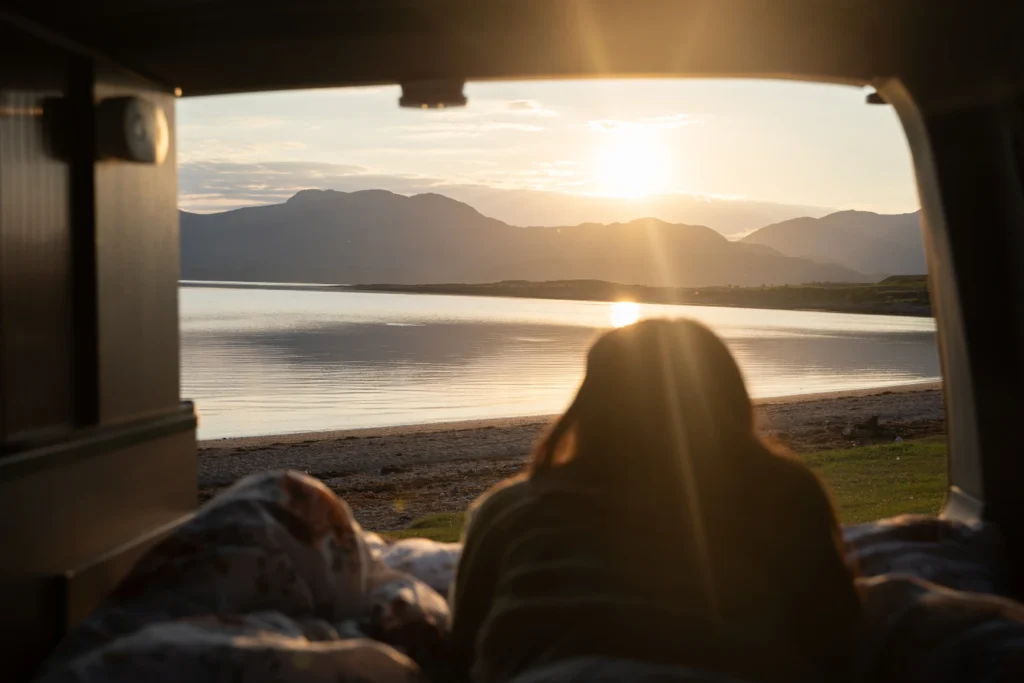
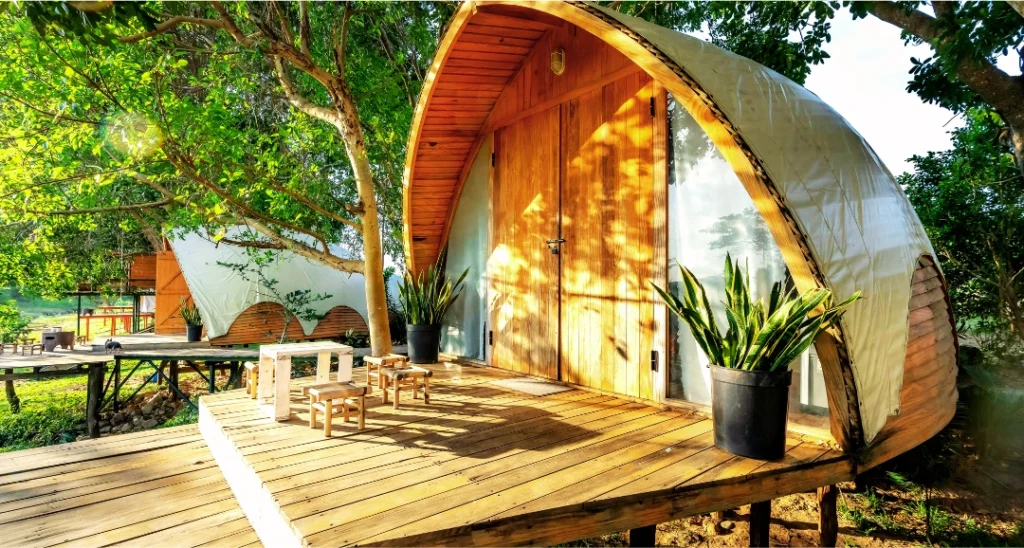
Glamping: Far-flung Fun!
If the idea of roughing it sends shivers down your spine but you still yearn for a connection with nature, then glamping is your perfect compromise!
It’s camping with a touch of luxury, blending the thrill and novelty of new surroundings with a touch of home. Think spacious safari tents, cosy yurts, stylish pods, and even treehouses, all equipped with proper beds, heating, and often private facilities.
Why You’ll Love It
- Stress-free Comfort: This is the core appeal of glamping. You get a real bed, often high-quality linens, heating, and sometimes even electricity, along with a private bathroom. No more wrestling with tent poles or sleeping on thin mats! It’s a pampering experience in the heart of nature.
- Immersive & Unique: Glamping accommodations are often quirky and distinctive, offering a unique stay that’s far more memorable than a standard hotel room. From stylish pods to treehouses, each stay is an adventure in itself, perfect for those seeking something truly extraordinary. This element of surprise and intrigue is what makes glamping so exciting.
- Ideal for Beginners: If you’re new to the outdoors or unsure about traditional camping, glamping provides a gentle introduction, allowing you to enjoy the benefits of nature without the challenges.
- Amenities: Many glamping sites offer additional amenities, such as communal kitchens, hot tubs, fire pits, and even add-on activities, to enhance your stay.
- Instagrammable: Let’s be honest, glamping structures are often incredibly photogenic, perfect for sharing your adventures online!
Things to Consider
- Cost: Glamping can be significantly more expensive than traditional camping and often comparable to (or even exceeding) hotel prices, especially for high-end options.
- Less Spontaneous: Unlike wild camping or even campervanning, glamping typically requires pre-booking, especially during peak seasons, limiting spontaneity. To ensure you get the best experience, it’s advisable to book your glamping site well in advance. Many popular sites can fill up quickly, so early planning is key to securing your ideal spot.
- Still “Outdoors”: While luxurious, you are still exposed to the elements to some degree. You may encounter insects, fluctuating temperatures, or mud, depending on the weather conditions.
- Limited Privacy (Sometimes): Depending on the site layout, some glamping units might be relatively close to each other, reducing privacy compared to truly remote wild camping.
- Less “Authentic”: For hardcore outdoor enthusiasts, glamping might feel too sanitised and remove some of the raw, back-to-basics appeal of traditional camping.
- Fixed Location: Once you’ve booked your spot, you’re tied to that location for the duration of your stay, unlike the mobility of a campervan.
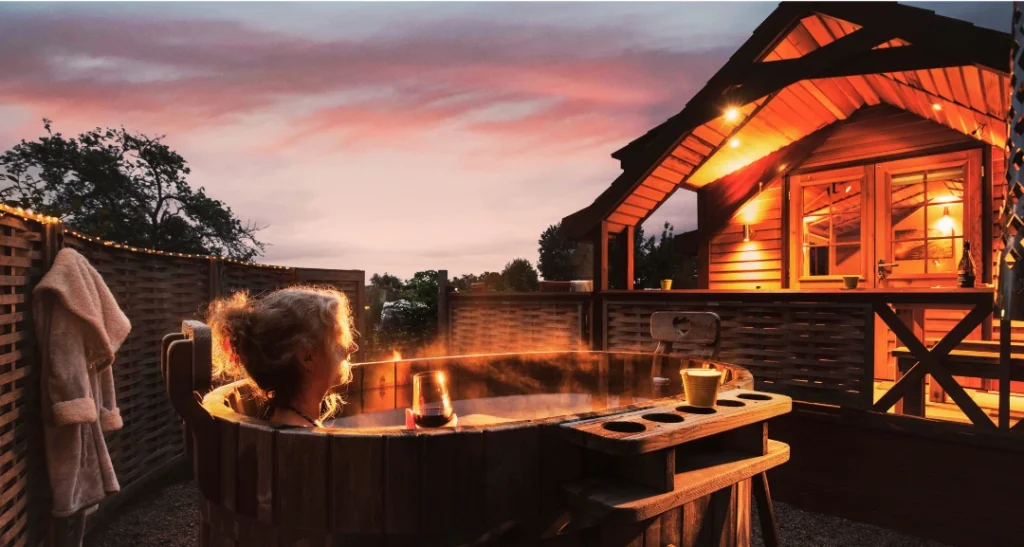
Wild Camping: True Grit!
For the adventurous souls who genuinely want to disconnect and immerse themselves in nature, wild camping offers a unique and challenging experience – setting up your tent off-grid in the wild, free of amenities and facilities, and taking the chance to test yourself against the elements.
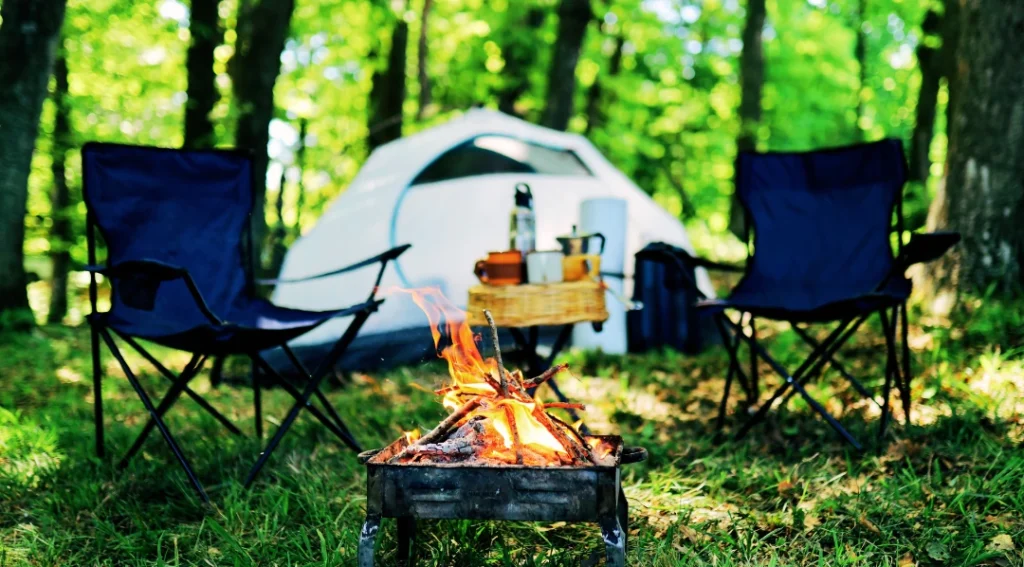
Why You’ll Love It
- Tranquillity: This is where you truly escape the rush and enjoy true peace!
- Cost-Free: With no campsite fees, wild camping is the most budget-friendly accommodation option (remember to be respectful, legal and responsible).
- Natural Immersion: You’re fully exposed to the elements and intimately connected with the natural environment, offering a profound sense of self-awareness.
- Challenging: It requires planning, self-reliance, and resilience, making the experience incredibly rewarding and empowering.
- Access to Remote Areas: Wild camping allows you to explore areas that are inaccessible to vehicles or official campsites.
Things to Consider
- Local Legality: This is a significant obstacle, as wild camping is illegal or heavily restricted in many areas, particularly in England and Wales. It is generally tolerated in most of Scotland (with adherence to the Scottish Outdoor Access Code) and some areas of Dartmoor in England, but always research local laws thoroughly!
- No Facilities: You’re completely self-sufficient, which means carrying all your water, packing out all your waste (including human waste), and having no access to toilets, showers, or charging points.
- Safety and Security Concerns: Being in a remote location means you’re more exposed to potential risks from wildlife, adverse weather, or isolation. Personal safety can be a concern, especially for solo campers!
- Environmental Impact: Without proper adherence to Leave No Trace principles, wild camping can easily damage fragile ecosystems (including leaving litter, human waste, and direct damage to vegetation).
- Requires Equipment and Knowledge: You need appropriate lightweight camping gear (tent, sleeping bag, cooking equipment, navigation tools) and the skills to use them, including wilderness first aid and navigation.
- Weather Vulnerability: While a good tent offers protection, you are significantly more exposed to severe weather conditions (such as wind, rain, and cold) than you would be in a vehicle or a glamping unit.
- Comfort (or Lack Thereof): Sleeping on uneven ground, dealing with insects, and the absence of amenities can be uncomfortable for those not used to it.
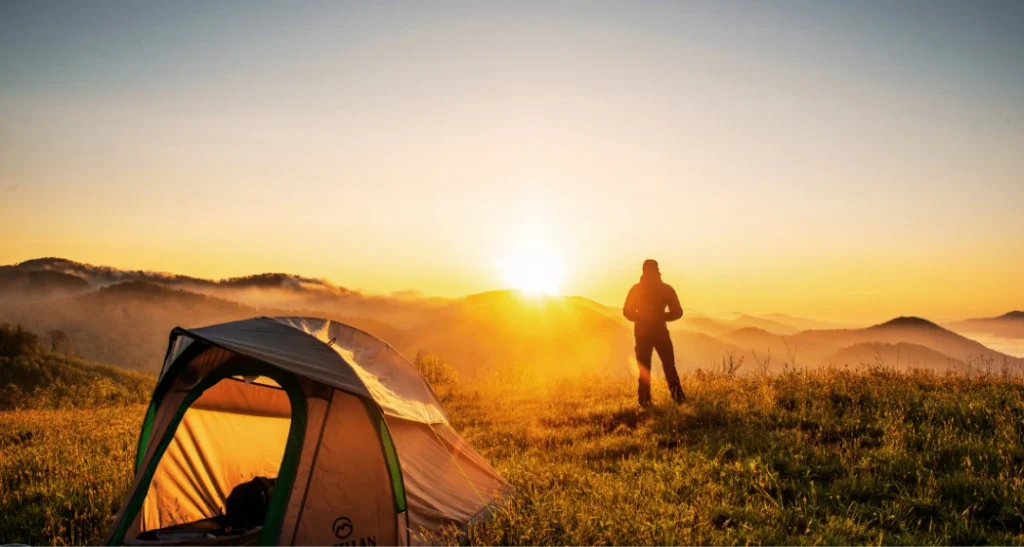
Good Luck!
Alright, so picking the perfect place to crash on your next road trip just comes down to what you’re into, how much cash you’ve got, and what kind of adventure you’re chasing!
If you’re all about total freedom and want your home on wheels, a campervan’s your jam. If you’re looking for a bit of fancy and extraordinary nature experiences without the usual equipment-based fuss, glamping’s got you covered. And for the super daring who want to get lost in the wild and connect with nature, wild camping (done right, of course!) will give you some seriously unforgettable experiences.
No matter what you choose, the main goal is to create fantastic memories and soak up all the amazing sights and experiences the UK and Ireland have to offer. So, throw some stuff in a bag (or just grab your sleeping bag!), hit the road, and let the good times roll!
Safe travels!
